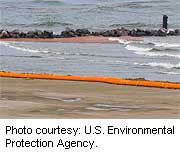
MONDAY, Aug. 23 (HealthDay News) — The fate of fishermen involved in cleaning up a massive oil spill off the northwest coast of Spain in 2002 could shed light on potential health problems facing workers involved in the recent Deepwater disaster in the Gulf of Mexico.
Authors reporting in the Aug. 24 online issue of the Annals of Internal Medicine found that Spanish fishermen exposed to the earlier oil spill had higher rates of respiratory symptoms. Although their lung function was not significantly different from fishermen who had no contact with the spill, the exposed individuals were more likely to have biomarkers for lung disease. And compared to their counterparts who were not exposed to the oil spill, a higher proportion of exposed fishermen also showed chromosomal abnormalities in the immune cells known as lymphocytes, which the authors conjecture might be a harbinger of later cancer.
Although it’s not at all clear what the long-term or even mid-term effects of the Deepwater disaster are likely to be, people involved in the clean-up at least need to be aware of potential risks, experts noted.
“When you have this massive of a spill, the number of people working out there have to be aware of the potential effects of being immersed in a hot, petroleum-rich environment where people are inhaling fumes,” said Dr. Jeff Kalina, associate medical director of the emergency department at The Methodist Hospital in Houston.
The authors of the Spanish paper followed 501 fishermen who had been exposed during the clean-up of 67,000 tons of bunker oil off Galicia, Spain, comparing their health to 177 non-exposed fishermen two years after the spill.
Oil-exposed fishermen were 8 percent more likely to have lower respiratory tract symptoms than their non-exposed counterparts. Some also had indications that their airways were trying to heal themselves, indicating some type of previous injury.
Not surprisingly, fishermen who had had more exposure to fumes and chemicals were more likely to exhibit problems than those who had had less contact. The same appears to be coming true in the Deepwater episode.
Still, there were many differences between the two spills, so any comparisons with the 50,000 workers who have been toiling in and near Deepwater need to be taken with a grain of salt, experts noted.
For one thing, the earlier spill involved a very different type of oil.
“I think the two events were actually very, very different as far as human exposure was concerned, the reason being that the Spanish spill involved bunker fuel, which is a thoroughly nasty mixture of petroleum ingredients that has a lot of volatile components,” said Dr. Arch Carson, director of the Occupational and Environmental Medicine Residency program at The University of Texas Health Science Center at Houston.
Moreover, Carson added, in Spain, “it was fresh oil on the surface of the water that actually washed onto the beaches, and most of the people were exposed to fresh oil.”
In the Gulf Coast, he pointed out, most of the oil reaching shore is extremely weathered or in the form of tar balls or asphalt. “Most of the volatile stuff is gone,” he said.
Differences between the two events are likely compounded by “the fact that this oil came from a mile down and had to travel through miles of water before it got to surface,” Carson explained. “That may sound trivial but in actuality it’s very important because moving through that long a water column actually strips quite a bit of components from the oil, and they dissolve in the water.”
Also, it’s not clear which, if any, dispersants were used in the earlier episode.
A lot of the health troubles already seen in the Gulf have been attributed to dispersants that have been used, said Dr. Carl Boethel, an assistant professor of internal medicine and section chief of pulmonary medicine at Texas A&M Health Science Center College of Medicine.
But with both spills, much is still unknown.
“With any type of exposure to any type of chemical, we’re still learning so much about all of this,” Boethel said. “How do we take this, learn from it and make it better?”
More information
The U.S. Environmental Protection Agency has more about the Deepwater oil spill.

